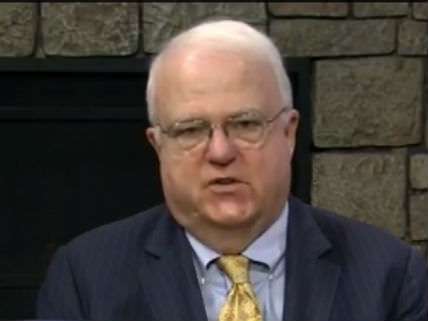Bipartisan Bill Would 'Reserve Federal Prisons for Serious Offenders'
The SAFE Justice Act tackles overcriminalization and overfederalization.

Yesterday Reps. Jim Sensenbrenner (R-Wis.) and Bobby Scott (D-Va.) unveiled an impressive package of criminal justice reforms that they have dubbed the Safe, Accountable, Fair, and Effective (SAFE) Justice Act of 2015. According to a summary by Families Against Mandatory Minimums (FAMM), the SAFE Justice Act would eliminate federal penalties for simple possession of drugs in jurisdictions subject to state law, reserve mandatory minimum sentences for high-level drug traffickers, make the shorter crack sentences enacted in 2010 retroactive, clarify that gun-related mandatory minimums can run consecutively only "when the offender is a true recidivist," expand the "safety valve" for nonviolent drug offenders, encourage more use of diversion and probation, and offer prisoners time reductions in exchange for their participation in job training and other programs aimed at reducing recidivism. FAMM says the bill "restores discretion to judges to determine to what extent manipulated conduct that results from fictitious law enforcement 'stings' may be considered in court." The bill also addresses criminal penalties for regulatory violations, requiring public disclosure of newly created offenses and allowing defendants to contact the Justice Department's inspector general if they believe their actions were inappropriately treated as a criminal matter.
The text of the bill does not seem to be available online yet, but I gather that the provision dealing with simple possession means people who buy and use marijuana in compliance with state law will no longer be committing federal crimes. It also means that people caught with other drugs will be prosecuted under state law rather than federal law. Together with the language narrowing the application of mandatory minimums, that change should help reduce the number of minor drug offenders in prison. "The SAFE Justice Act would reserve federal prisons for serious offenders and let the states handle the small fry," says FAMM President Julie Stewart. "When I was a kid, there was an expression: 'Don't make a federal case of it.' For the past 30 years, nearly every corner drug sale could be made into a 'federal case.' I look forward to the SAFE Justice Act restoring Congress's original intent and the correct state-federal balance in criminal justice."
The gun provision could make a big difference in cases where drug offenders who own guns are hit with multiple counts based on separate transactions. The first time someone possesses a gun in connection with a drug offense (whether or not he uses the gun, let alone injures anyone with it), the penalty is a five-year mandatory minimum. The penalty jumps to 25 years for subsequent offenses, and the sentences must be served consecutively. That's how Weldon Angelos got a 55-year sentence for three penny-ante pot sales.
FAMM says another provision of the SAFE Justice Act would allow life sentences for drug trafficking "only in the most egregious cases." Presumably that would prevent outrageous injustices like the two life sentences that a harmless Deadhead named Timothy Tyler received for mailing LSD.
In addition to FAMM, the bill's supporters include the American Civil Liberties Union, the American Conservative Union, and Americans for Tax Reform. Its 20 initial cosponsors are evenly divided between Democrats and Republicans.
Update: The text of the bill is here.


Show Comments (36)